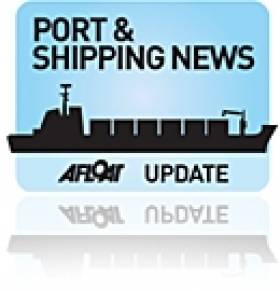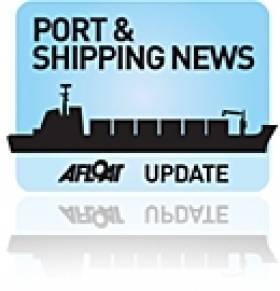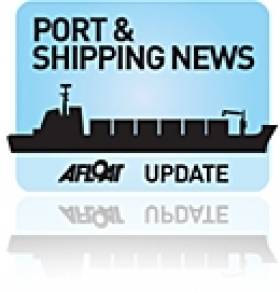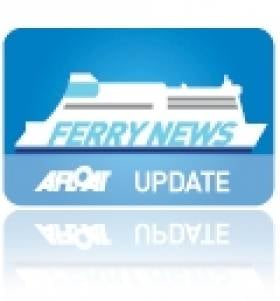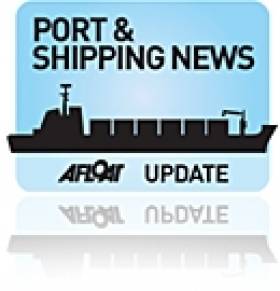Displaying items by tag: Irish Continental Group (ICG)
#ICGinterimstatement – Irish Continental Group (ICG) has issued below this interim management statement which covers carryings up to 17 May 2014 (i.e. 20 weeks) and financial information for the first four months of the year, i.e. January to April.
Volumes (Year to date, 17 May 2014)
Change
Passengers: 441,100 (0%)
Cars: 95,000 (+5%)
RoRo Freight: 87,900 (+18%)
Container Freight (TEU): 107,800 (+1%)
Terminal Lifts: 69,700 (+6%)
It should be noted that ICG's business is significantly weighted towards the second half of the year when normally a higher proportion of the Group's operating profit is generated than in the first six months.
During the period we inaugurated our weekly Dublin to Cherbourg service, operated by the recently chartered 'Epsilon', alongside 8 additional round trips on Dublin-Holyhead. Total sailings operated across all routes were up as a result by 17%. The financial results for the four months reflect the additional costs of operating the 'Epsilon' during the start-up phase on both the Dublin-Cherbourg and Dublin-Holyhead routes.
In the 20 weeks up to 17 May 2014, Irish Ferries carried 95,000 cars, an increase of 5% on the previous year. While car passenger numbers were up, in line with the car volumes, total passenger volumes were in line with the previous year at 441,100 due to a fall in foot passenger carryings.
In the Roll on Roll off freight market, Irish Ferries carried 87,900 units, an increase of 18% compared with the same period in 2013, reflecting the additional capacity of the 'Epsilon' and a growing freight market.
Container freight volumes shipped increased 1% to 107,800 TEU (twenty foot equivalent units), while units handled at our terminals in Dublin and Belfast rose 6% year on year, over the same period, to 69,700 lifts.
In the first four months of the year, Group revenue rose 5.8% to €76.7 million, compared with €72.5 million in the same period last year. Operating costs (before depreciation & amortisation) were 9.0% higher at €73.8 million, versus €67.7 million the previous year, mainly reflecting the incremental operational and port costs of operating 'Epsilon'.
Earnings before interest, tax, depreciation and amortisation (EBITDA) were €2.9 million compared with €4.8 million in the same period in 2013. The operating loss was €2.6 million compared with an operating loss of €1.1 million in 2013. There was a net finance charge of €1.7 million, down €0.3 million compared with the previous year. The loss before tax was €4.3 million (2013: loss of €3.1 million).
Following the (previously announced) accelerated receipt of charter hire on the deferred sale of the vessel, 'SPL Princess Anastasia' (formerly Pride of Bilbao), to St Peter Line of St Petersburg, Russia, the Group's net debt at the end of April was €72.3 million compared with €93.4 million at 31 December 2013.
Irish Continental Group Half-Yearly Financial Report
#ICGHalfYearReport- Irish Continental Group have released their Half-Yearly Financial Report for the Half Year Ended 30th June 2013.
In a comment by ICG chairman, John B. McGuckian he stated; 'This was a positive half years trading with increases in revenue and operating profit driven mainly by higher freight carryings and lower fuel costs, partially offset by weaker passenger markets. Summer trading has been encouraging across most business areas, with volume growth in passenger and freight offset by weaker sterling, which affects tourism yields".
Results
In the prior year the Group disposed of its subsidiary Feederlink and the comparatives set out in the Interim Management Report have been restated to exclude trading from discontinued operations.
The Board of Irish Continental Group plc (ICG) reports that, in the seasonally less profitable first half of the year, the Group recorded revenue of €120.9 million compared with €117.0 million in the same period in 2012, an increase of 3.3%.
Earnings before interest, tax, depreciation and amortisation (EBITDA) was €15.8million compared with €14.1 million in the same period in 2012.
Operating profit was €6.4 million compared with €4.9 million in 2012.Group fuel costs were €23.9 million compared with €25.7million in the same period in 2012.
There was a net finance charge of €3.1million (2012: €1.2 million) which includes a net pension expense of €1.0 million (2012: €0.8 million) and net bank interest payable of €2.1million (2012: €0.4 million).
Profit before tax was €3.3 million compared with €3.7 million in the first half of 2012. The tax charge amounted to €0.3 million (2012: €0.3million).
On a continuing basis EPS was 16.4c compared with 13.7c in the first half of 2012. Adjusted EPS (before non-trading items and net pension interest expense) amounted to 21.8c (2012: 16.9c).
Dividend
The Board declares an interim dividend of 33centper ICG Unit payable on4October to shareholders on the register at 20 September 2013.
Operational Review: Ferries Division
The division comprises Irish Ferries, a leading provider of passenger and freight ferry services between Ireland and both the UK and Continental Europe (in this 40th anniversary year), and the bareboat chartering of multipurpose ferries to third parties. Irish Ferries operated 2,119 sailings in the period, up 1.5% on 2012.
Revenue in the division was €69.4 million (2012: €69.5 million). Profit from operations increased to €4.0 million (2012: €3.2 million), with a €1.3 million(7.0%) reductionin fuel costs to €17.2 million, partially offset by higher drydock costs incurred on one of the vessels in the fleet.
In the first half passengers carried were up 0.3% at 678,400 while total carscarried in the first half of 2013were 142,500, down 4.2% on the previous year, but at higher yields.
In RoRo freight, Irish Ferries' volumes were up 7.9% to99,700 units, when compared with the first half of 2012.
The MV Kaitaki as previously reported on Afloat.ie, remained on charter to P&O during the period, trading in New Zealand. The charter to P&O terminated on 30 June 2013 following which a new charter commenced, on 1 July 2013 to KiwiRail.
The new charter is for a period of 4 years with an option for the charterer to extend by a further 3 years.
Operational Review: Container and Terminal Divisions
The Container and Terminal Division include the shipping line EUCON as well as the division's strategically located container terminals in Dublin (DFT) and Belfast (BCT).
Turnover in the division was up 8.3 % to € 52.2million (2012: 48.2 million), while profit from operations was € 2.4 million (2012: €1.7 million) reflecting stronger shipping volumes. Fuel costs in the division were down 6.9% at €6.7 million.
Total containers shipped were up11.3% at 140,600 TEU (2012: 126,300 TEU). Units lifted at the division's port facilities in Dublin and Belfast were down 3.5% at 86,400 lifts (2012: 89,500 lifts) with an increase in Dublin being offset by a reduction in Belfast due to ship schedule changes.
Financial Position (EBITDA) for the period was €15.8million compared with €14.1 million in the same period in 2012. Cash flow generated from operations was €23.1million versus €17.6million in 2012.
Capital expenditure in the period was €6.6million (2012: €5.1million) while pension payments in excess of service costs amounted to €2.4 million (2012: €3.0 million).
Free cash flow (net cash from operating activities after capital expenditure) was €14.2million compared with €11.9million in the previous half year.
Net debt at the end of the period a mounted to €105.4million and this compares with €116.0 million at 31 December 2012.
The final dividend for 2012, amounting to €12.3 million was paid during the period. Shareholders equity decreased to €11.8million from €18.0million at 31 December 2012.
The main reasons for the decrease were primarily due to the dividend paid of €12.3 million offset by €6.0 million of total comprehensive income, which includes an actuarial gain arising on the retirement benefit obligation of €2.0 million and a profit for the period of € 3.0 million.
For a further in depth analysis of ICG's Half Yearly Financial Report for the Half Year Ended 30th June 2013, click this link to download a PDF copy.
Irish Ferries Operating Profits Remain Unchanged at €3.2m
#FERRY NEWS- The Irish Continental Group (ICG) ferries division, Irish Ferries has recorded no change in operational profits for the first six months of 2012, compared to the same period last year.
According to its financial interim report, profit from operations was unchanged at €3.2 million (2011: €3.2 million), after a €2.5 million increase in fuel costs. Revenue in the division was €69.5 million (2011: €68.2 million).
Irish Ferries operates passenger and freight ferry services between Ireland-UK and between Ireland and France. In the first six months of 2012, Irish Ferries operated 2,087 sailings in the period, down 2.8% compared to the same period last year.
In the half year the operator reported an increase in total passengers carried of 0.9% at 676,700 while total cars carried in the first half of 2012 were 148,700, down 1.9% on the previous year, but at higher yields. The overall sea passenger market was down 3.3% and the car market was down 7.5%.
On the freight Ro-Ro sector, volumes were down 4.7% to 92,400 units, when compared with the first half of 2011 reflecting the weak economic backdrop. The total Ro-Ro market is estimated to be down about 3% in the six months.
The MV Kaitaki, the former Irish Sea serving Isle of Innishfree (1995/22,365grt), remained on charter to P&O during the period, trading in New Zealand. Since her transfer in 2006, the Dutch built ro-pax has been operating Interislanders' Wellington-Picton service which links the country's north and south islands.
Irish Continental Group Release Financial Interim Report 2012
#PORTS & SHIPPING - Below is a comment from John B. McGuckian, chairman of the Irish Continental Group (ICG) on the half-yearly financial report for the six months ended 30 June 2012.
Mr. McGuckian said, "I am pleased to report a robust performance in the first six months of the financial year. Turnover grew, albeit moderately while EBITDA was €14.3 million in the first six months of the year, down only €1.8 million despite an increase of €4.5 million in our fuel bill in the period.
With regard to current trading, while freight remains weak due to the economic background our tourism and car business has benefited from reduced competitor capacity although fuel costs remain a headwind.
With our strong cash flow and balance sheet we propose an unchanged interim dividend of 33 cent per ICG Unit and due to the strength of our capital position propose a return to shareholders of up to €111.5 million via a tender offer buy-back, which is subject to shareholder approval.‟‟
Interim Management Report for the six months up to 30 June 2012
Results
The Board of Irish Continental Group plc (ICG) reports that, in the seasonally less profitable first half of the year, the Group recorded revenue of €127.1 million compared with €126.6 million in the same period in 2011 an increase of 0.4%.
Earnings before interest tax and depreciation (EBITDA) were €14.3 million compared with €16.1 million in the same period in 2011.
Operating profit was €5.1 million compared with €6.5 million in 2011. Group fuel costs were €28.9 million compared with €24.4 million in the same period in 2011. There was a net finance charge of €1.2 million (2011: €0.3 million) which includes a net pension expense of €0.8 million (2011: credit of €0.1 million) and net bank interest payable of €0.4 million (2011: €0.4 million).
Profit before tax was €3.9 million compared with €6.2 million in the first half of 2011. The tax charge amounted to €0.3 million (2011: €0.1 million). Basic EPS was 14.5c compared with 24.4c in the first half of 2011. Adjusted EPS (i.e. before the net pension interest expense) amounted to 17.7c (2011: 24.0c).
Dividend
The Board declares an interim dividend of 33 cent per ICG Unit payable on 5 October to shareholders on the register at 21 September 2012.
Disposal of Subsidiary
On 29 August 2012 the Group entered into an agreement for the sale, subject to regulatory approval, of its subsidiary Feederlink Shipping and Trading b.v. for a consideration of up to €29 million. All details are available from clicking this link: http://www.icg.ie/documents/2012/2012-07-30-Half-Year-Results.pdf
Rising Costs Scuttle ICG's Ferry Profits
#FERRY NEWS – The Irish Continental Group (ICG) operators of ferry division Irish Ferries, said today its pre-tax profit for last year fell by 30 per cent to €28.2 million on the back of higher fuel costs, reports The Irish Times.
Despite the tough trading conditions, the group said it revenue for 2011 rose by 4.2 per cent to €273.3 million. Irish Ferries saw its passenger numbers for the year fall marginally by 0.7 per cent to 1,527 million, while its roll-on roll-off freight rose up by 9 per cent.
The company said the extremely challenging economic circumstances in the Republic contributed to the lack of growth in the market, and the pressure on operating costs for our freight customers remained intense.
Chairman John B McGuckian predicted the current year would remain challenging as fuel costs have further increased but with the group's "disciplined approach to capacity" he said he was confident of its prospects.
In the year to date, the ferry operator has carried 31,100 cars, down 8.5 per cent on 2011 and 138,600 passengers, up 0.8 per cent on 2011.
The reduction in car carryings partially reflects an 11 per cent reduction in sailings in the year to date but also a quieter than expected start to the year, it said.
Irish Ferry Leaves as UK-Spanish Route Closes
The cruiseferry, Pride of Bilbao, owned by the Irish Continental Group (ICG) made the last return sailing on the Portsmouth-Bilbao route, when the vessel
docked at the UK port yesterday (28 September), writes Jehan Ashmore.
The service was launched in 1993 with the chartering of Pride of Bilbao. In the following year, the overnight cruiseferry, owned by Vilking Line was acquired by ICG (the parent company of Irish Ferries) and the vessel was re-registered in the Bahamas.
The vessel was placed under a British bare-boat register. The charter arrangement between P&O Ferries and ICG was extended for another five years in 2002 and again for a further three years from 2007. The final charter term remained valid up to the route closure.
Orginally the Pride of Bilbao was built for Scandinavian service as the Olympia in 1986. The newbuild was launched on Viking Line's Helsinki-Stockholm route and at the time the vessel was one of the largest overnight passenger capacity ferries in the world. At 37,583 tonnes the vessel has 2,553 passengers and space for 600 vehicles. In addition the cruiseferry has comprehensive facilities and a wide choice of cabin accommodation.
The closure of the Bilbao route is temporary as Brittany Ferries are to re-launch the route in Spring 2011. The French ferry company's existing Portsmouth - Santander route ferry, Cap Finistère will also provide two sailings weekly to Bilbao. In total the there will be five sailings weekly between the UK to Spain, two from Portsmouth to Santander and a single round-trip to Plymouth. Other vessels from the Brittany Ferries fleet will assist Cap Finistere on the three Spanish routes.
After 17 years plying the Bay of Biscay, the Pride of Bilbao is now freed-up providing new opportunities for the ICG vessel. Throughout the vessel's career
under ICG, the cruiseferry has only made a single visit to an Irish port. The ship was sub-chartered for a three-day Christmas mini-cruise to Dublin in 2004 starting and ending in Portsmouth.



























